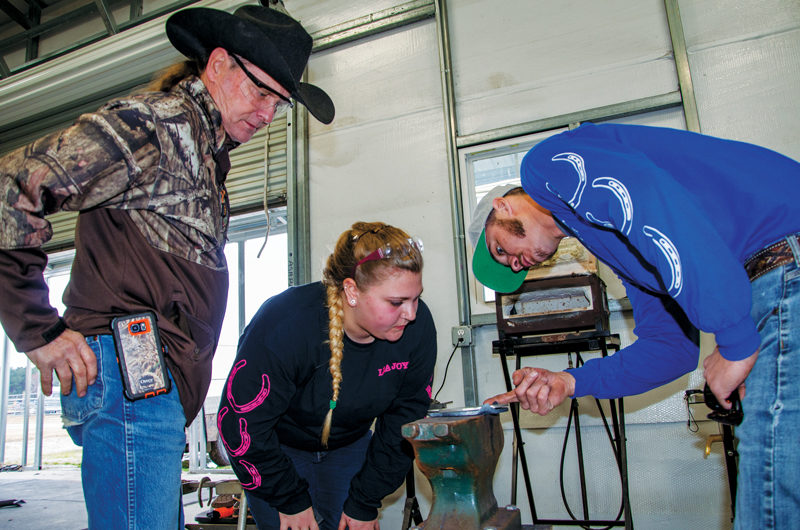Pictured Above: Ritner and RJ Goff offer Lea Joy pointers on fitting a shoe to an American Farrier’s Association pattern. The father-son team emphasizes the importance of apprentices pursuing certification through the AFA.
Burgaw, N.C., farrier Ritner Goff has some advice for established farriers — hire an apprentice.
“The sooner the better to take some pressure off and get some relief for your body,” he says. “Once you get your business established, and you’re doing well and can take on an apprentice, I would, especially by the time you’re 50. It’s a big help.”
Goff has been hiring apprentices for 14 years. Along the way, he’s forged some rewarding relationships and learned some valuable lessons.
“I’d like to say it was all planned, but it just kind of evolved,” he says. “I’m a typical farrier. I started out helping one guy and I realized that it’s kind of nice having somebody around to help. It just expanded from there.”
Early on, the apprentices lived in his three bedroom, one bath home on a 12-acre parcel. Some apprentices, though, wanted a little more privacy and were willing to trade some space to get it.
“When I first started out, I had a horse trailer with living quarters in it,” Goff recalls. “They’d always come to the house, eat and watch TV. Then one or two boys would go sleep in the horse trailer where there was privacy.”
Things have changed quite a bit since then. Goff now resides and operates out of CrossRoads Farm, a 70-acre fully working farm that’s also home to both the horseshoeing business and the metal business. The facility comes complete with a private place to stay for the apprentice — an 1,100-square-foot double-wide mobile home that has two large bedrooms, a family room, dining room, kitchen and two baths.
To earn a spot on the team, the apprentice must live up to some qualifications.
“I’ve got my name and contact information in all of the schools around the country,” Goff says. “When they think they have an apprentice who qualifies to come to our place, they’ll give me a call. We have to have the best in their class. They know not to send me anything less than the best.”
Just because they get a foot in the door, doesn’t mean it’s a done deal.
“They have to sign a contract,” he says, “and complete a 30-day probation period to see if we’re all going to get along.”
The apprentice must be hungry to not only work hard, but strive for advancement.
“We make them practice in the shop and work toward their American Farrier’s Association certification,” Goff says. “That’s mandatory. We press that because it really helps your skills by leaps and bounds and improves your knowledge of horse anatomy.”
To help them prepare for certification, Goff’s wife Susan Hermanson prepares a different written test each night. The students take it the next morning.
“Then we have this shop where we come practice, make and modify shoes with a focus on making the modifications required for the AFA shoe board,” Goff says. “Then to help them pass the practical, we have 16-head of horses here besides our 300 to 400 horses in our business. So, there are plenty of horses to work on.”
As an added enticement, Goff pays a starting wage, plus room and board. A raise could be in the offing upon achieving certification.
“We start easy,” he says. “We let them pull and finish shoes for us. I can bring my horses in the shop and have the apprentices work on them. I can see their weaknesses and strengths and we really work on their weaknesses. Man, they really just improve by leaps and bounds.”








